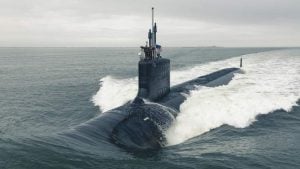Critical examination is necessary, but Keating is wrong.
All government policy is and should be held to close scrutiny and Australia’s largest ever defence spend deserves closer scrutiny than most, given its budgetary and strategic implications. Former Prime Minister Paul Keating’s tirade against the $360billion-plus AUKUS submarine purchase could be understood within this context.
There is no doubt that this sum of money could re-arm and re-equip much of Australia’s army for a defence-in-depth ‘fortress Australia’ strategic model and, at $16billion for 72 F-35 aircraft to replace the F/A-18s, Australia could have an air force deterrent capacity equal to or greater than any in the region for a fraction of the price.
And then there is the question of increasingly threadbare social services, a nation-wide housing crisis, Australia’s necessary but late transition from fossil fuels to renewables and myriad other claims on the budget. Even amortised over two and a half decades, the cost of 11 submarines raises serious questions about best bang for the buck.
Set against these complex, critical issues is Keating’s tirade against his own party in government. He has described the AUKUS submarine purchase, in Trump-like terms, as the ‘worst deal in history’ and, more moderately, of the worst Labor government decision since Billy Hughes committed, during World War I, to military conscription.
Keating has always been an entertaining speaker, for his colorful turn of phrase, his incisiveness and his unrestrained critical observation. Regardless of partisan politics, he has spoken to a frank humor – ‘a shiver looking for a spine to run up’, ‘Can a souffle rise twice?’ – that many Australians identify with.
Keating’s attack against the Albanese Labor government for continuing with the prior government’s AUKUS submarine commitment, however, has set new standards for his vitriol. He singled out for criticism Defence Minister Richard Marles and Foreign Minister Penny Wong as ‘two unwise ministers’.
Wong, in particular, has been adept at re-setting Australia’s foreign relations following their trashing in recent years. Keating’s criticism of her handing out money to Pacific island states as not being foreign policy fundamentally misunderstands the role of aid in retaining stable regional relations in an increasingly contested region.
This, then, goes to the nub of Keating’s criticism. He says that China is not, and will not be, a threat to Australia. Keating is correct to note that China currently benefits from its economic relationship with Australia. He is incorrect, however, in assuming that China does not wish to fundamentally re-order the strategic balance of the Indo-Pacific.
China has a recent history of using various forms of leverage to obtain its desired economic and strategic results. Its encroachment into the South China Sea up to its claimed ‘Nine Dash Line’ has already been established as in contravention of the UN Convention on the Law of the Sea (UNCLOS). That it has built up and militarised reefs and shoals can only be understood as acts of strategic assertion, if not aggression. And China is currently in the middle of the largest expansion of its military force since the 1949 revolution.
Keating was also critical of Australia being too closely tied to US foreign policy. There is little doubt that ‘America right or wrong’ is not a sensible base-line for Australian foreign policy, given its recent, democratically compromised history and its varied commitment to its international agreements.
But the US is, and has for eight decades been, Australia’s key strategic partner, including under Keating’s own term as Prime Minister. Does the relationship require nuance? Certainly. Should Australia walk away from it? The US may not be a perfect strategic partner, but it is the one we have. Keating has acknowledged this on numerous occasions.
Setting aside this contradiction, there is the question of Keating’s own judgement, by his own account untainted. While Australia’s economy needed to change in the 1980s, his unqualified commitment to neo-liberal economic policy has not been without significant costs, including the impact of the Global Financial Crisis, the growing gap between rich and poor and the piece by piece dismantling of the middle class upon which a functional democracy relies, not to mention the commodification of everything from goods to social relations.
Then there is Keating’s own foreign policy. Setting aside his own reinforcement of Australia’s strategic partnership with the US, and his related critique of the UK as an unreliable ally, his commitment to the region – that for which he has criticised Wong – was mainstream post-war Labor.
But only Keating could believe his own judgment so infallible as to be unreflective supplicant to Indonesia’s President Suharto, who he called ‘Pak Harto’ (Father Harto) as he sat at the corrupt and brutal despot’s feet. As a footnote to his supplication, he enhanced Australia’s strategic relationship with the Indonesian military, his public rationale precisely being concern over China. Yet, out of office, he has become part of the Xi Jinping cheer squad; the ‘Beijing Lobby’, reinventing his leading role at the head of the Jakarta Lobby three decades earlier.
It was Keating’s government which demurred, in support, over Indonesia’s occupation of East Timor, including the Santa Cruz Massacre. It took a powerbroker from Keating’s own NSW head-kicker Right, Laurie Brereton, to bring Labor policy to that which overturned the previous Keating government policy on East Timor. The rest, as they say, is history.
So, is the AUKUS submarine deal worthy of close critical examination? Absolutely. Is Keating’s criticism of the deal correct? It is profoundly flawed, not least because Keating’s own foreign policy credentials are so wanting.
*Emeritus Professor at Deakin University. With Richard Iron, he is editor of ‘How Wars End’ (Routledge 2023) and author of ‘The Rise and Decline of Modern Democracy’ Routledge 2023).
